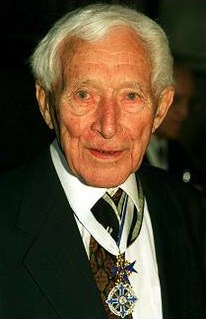A Quote by Alexandre Kojeve
The man who works recognizes his own product in the world that has actually been transformed by his work. He recognizes himself in it, he sees his own human reality in it he discovers and reveals to others the objective reality of his humanity of the originally abstract and purely subjective idea he has of himself
Related Quotes
But the man who is not afraid to admit everything that he sees to be wrong with himself, and yet recognizes that he may be the object of God's love precisely because of his shortcomings, can begin to be sincere. His sincerity is based on confidence, not in his own illusions about himself, but in the endless, unfailing mercy of God.
Man—every man—is an end in himself, not a means to the ends of others; he must live for his own sake, neither sacrificing himself to others nor sacrificing others to himself; he must work for his rational self-interest, with the achievement of his own happiness as the highest moral purpose of his life.
When the father dies, he writes, the son becomes his own father and his own son. He looks at is son and sees himself in the face of the boy. He imagines what the boy sees when he looks at him and finds himself becoming his own father. Inexplicably, he is moved by this. It is not just the sight of the boy that moves him, not even the thought of standing inside his father, but what he sees in the boy of his own vanished past. It is a nostalgia for his own life that he feels, perhaps, a memory of his own boyhood as a son to his father.
If God wishes to be born as man and to unite mankind in the fellowship of the Holy Ghost, He suffers the terrible torment of having to bear the world in its reality. It is a crux; indeed, He Himself is His own cross. The world is God's suffering, and every individual human being who wishes even to approach his own wholeness knows very well that this means bearing his own cross. But the eternal promise for him who bears his own cross is the Paraclete.
Christianity affirms that at the heart of reality is a Heart, a loving Father who works through history for the salvation of His children. Man cannot save himself, for man is not the measure of all things and humanity is not God. Bound by the chains of his own sin and finiteness, man needs a Savior.
Returning from the wilderness a man becomes a restorer of order, a preserver. He sees the truth, recognizes his true heir, honors his forbears and his heritage, and gives his blessing to his successors. He embodies the passing of human time, living and dying within the human limits of grief and joy.
Do what he will, he [the profane man] is an inheritor. He cannot utterly abolish his past, since he himself is a product of his past. He forms himself by a series of denials and refusals, but he continues to be haunted by the realities that he has refused and denied. To acquire a world of his own, he has desacralized the world in which his ancestors lived; but to do so he has been obliged to adopt an earlier type of behavior, and that behavior is still emotionally present in him, in one form or another, ready to be reactualized in his deepest being.
Private property is a natural fruit of labor, a product of intense activity of man, acquired through his energetic determination to ensure and develop with his own strength his own existence and that of his family, and to create for himself and his own an existence of just freedom, not only economic, but also political, cultural and religious.
The (capital punishment) controversy passes the anarch by. For him, the linking of death and punishment is absurd. In this respect, he is closer to the wrongdoer than to the judge, for the high-ranking culprit who is condemned to death is not prepared to acknowledge his sentence as atonement; rather, he sees his guilt in his own inadequacy. Thus, he recognizes himself not as a moral but as a tragic person.
The believer is sensible of his infirmities, for it is supposed that he is wrestling under them. He sees, he feels, that he is not man enough for his work; that his own hands are not sufficient for him, nor his own back for his burden; this is what drives him out of himself to the grace that is in Christ Jesus. And thus he lies open to the help of the Spirit, while proud nature in unbelievers is left helpless.
Every man is of importance to himself, and, therefore, in his own opinion, to others; and, supposing the world already acquainted with his pleasures and his pains, is perhaps the first to publish injuries or misfortunes which had never been known unless related by himself, and at which those that hear them will only laugh, for no man sympathises with the sorrows of vanity.









































